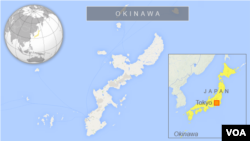In Okinawa, many locals have long complained that Tokyo places an unfair burden on the tiny island by locating most of Japan's U.S. military bases there.
In the past year, protests against U.S. bases and demands by Governor Takeshi Onaga to reduce the American military presence have put Okinawa at odds with the position of the leadership in Tokyo to strengthen the Japan-U.S. military alliance.
That has made Okinawa a focal point for opponents of Tokyo’s defense policies.
For over a year anti-war activists have camped out in front of the U.S. Marine Corps base Camp Schwab to protest the construction of a new airfield that is underway.
The base is located in the rural, coastal village Henoko, in the northeast region of Okinawa.
Diverse protesters
Early most mornings a small group of protesters attempt to block trucks and construction crews from entering the base. Many of the protesters are hardcore pacifists who object to the military’s presence on moral grounds.
“We cannot allow it to happen. I hate war. This base is connected to war and we can never allow it,” said Kikuko, a young Okinawan woman who declined to give her full name.
Other protesters are worried about the possible environmental impact of the construction project.
The plan approved by the Japanese government is to fill in much of the bay with sand and extend the shoreline for 2 kilometers to build two landing strips for military aircraft.
Environmentalists say the construction will destroy coral reefs and threaten the habitat of the endangered Dugong sea mammal.
Some protesters have taken to the sea in kayaks and small boats to disrupt the shoreline construction.
Others worry that the aircraft noise and increased traffic around the base will hurt tourism in Henoko.
But the movement’s leaders, like Junichi Tomita, the president of Ryukyu Shimpo, one of Okinawa’s influential newspapers, say the vast majority of Okinawans are not extremists, nor anti-American and not opposed to a strong national defense.
“The Okinawan people are not completely against the military, this is what I want to be clear about,” Tomita said.
Tomita said most Okinawans just want to scale back the large U.S. military presence that occupies 20 percent of the islands.
With nearly 75 percent of all U.S. bases in Japan located on Okinawa, the islands shoulder a disproportionate and unfair portion of Japan and U.S. defense forces, he said.
Troubled history
Many Okinawans have long felt this way, at least dating to 1879 when U.S. President Ulysses S. Grant helped negotiate a dispute between Japan and China over the ownership of the remote and once independent Ryukyu Islands.
At the time, Okinawans had their own language and culture, but since Japan’s annexation, island inhabitants were forced to learn Japanese and align with Tokyo.
The island played a key role in Japan’s defense in 1945, when hundreds of thousands of noncombatants died in the Battle of Okinawa.
After the war, the United States took over administrative control of Okinawa until 1972 and even after then, U.S. military personnel were to some extent exempt from jurisdiction of local law.
Tomita said Okinawans grew to resent the U.S. military as an occupying force.
In 1995, public outrage and protests erupted after three U.S. service members were charged with raping a 13-year-old Okinawan girl.
The incident led to a change in the interpretation of the Status of Forces Agreement to give Japanese authorities jurisdiction over crimes commmitted off-base, and off-duty.
The incident also led to an agreement to close the Marine Corps' Futenma airbase in the congested southern part of the island. Japan and the United States agreed to transfer the airbase facility to Camp Schwab.
Base relocation
Okinawa Governor Takeshi Onaga argues that expanding Schwab contradicts the intent of the agreement to reduce the American military presence. He wants the airbase relocated outside of Okinawa.
More than 19,000 U.S. Marines are stationed in Okinawa to rapidly respond to regional threats, provide disaster assistance and defend the interests of the United States and Japan.
Having an airbase on Okinawa is essential, the Marines said.
“So the Marine Corps’ role here is to be first and fastest to the scene of a disaster or any type of contingency operation that we may be directed to do,” said Capt. Caleb Eames, a public affairs officer with the U.S. Marine Corps in Okinawa.
Many Okinawans support the U.S. military bases as integral to the island’s economy. There have been few incidents of crimes or disturbances by U.S. soldiers in the past two decades.
And the United States has taken measures to reduce noise and disruptions to daily life on the island.
Still, Okinawa’s relationship with both Japan and the United States has a long and complicated history, which continues to fuel support for the current protests.
